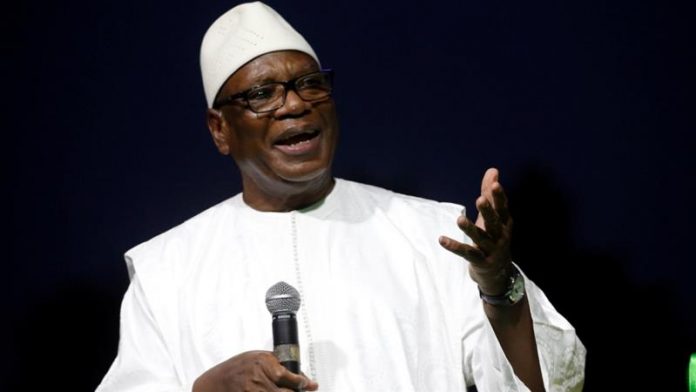Four African heads of state are expected in Bamako on Thursday to try to wrest an agreement between the authorities and the protesters.
Malian President Ibrahim Boubacar Keïta “IBK” is now the captain of a drunken boat threatened with being swept away by a self-generated storm. Since his accession to the head of state in 2013 and his re-election in 2018, “IBK” has already suffered episodes of contestation, caused in particular by the lack of progress in the conflict in the north of the country or the repeated killings that mourn the center. Never, however, had his power seemed so weakened.
Thursday July 23, a new delegation from the Economic Community of West African States (ECOWAS), this time made up of four sitting heads of state – Côte d’Ivoire, Ghana, Niger and Senegal – should meet go to Bamako to try to wrest a solution from the actors of the crisis and get the country out of the current impasse. The task promises to be difficult, even if the opponents declared, Monday evening, a truce of the mobilization until the end of the month.
To allow the mediators, led by former Nigerian President Goodluck Jonathan, to seek a solution, Imam Mahmoud Dicko and the leaders of the June 5 Movement-Rassemblement des forces patriotiques (M5-RFP) offered last week a respite from the regime, by announcing the postponement of the mobilization scheduled for Friday in memory of the 11 to 23 victims, according to the reports, killed during the demonstrations from July 10 to 12.
But, even before the end of the five days of discussions, the ECOWAS plan was rejected by the protesters, who re-launched their calls for “the resignation of ‘IBK'” and “civil disobedience”. A few roadblocks timidly reappeared Monday, July 20 in Bamako, the capital, to signal that the anger has not dissipated.
“The head of state has locked the entire political system”!
“The ECOWAS came with a plan stopped for the sole purpose of saving the soldier “IBK”. With the elections which are being prepared in Ivory Coast, Guinea, Burkina Faso or Niger, the authorities of the region are afraid of seeing their people in the street and that Mali will serve as an example to them”, states Choguel Maïga, one of the political leaders of the M5-RFP, a heterogeneous movement in which former “IBK” ministers, like Mr. Maïga, members of the revolutionary left, economic actors, and society activists meet, civil and religious.
More concerned with the societal development of Mali over the long term, Imam Mahmoud Dicko is not directly a member of this coalition, but here he plays the role of moral authority and mob mobilizer. Subject to contradictory pressures between a base which has hardened after the repression of the police and diplomats who encourage it to continue negotiations around a government of national unity, his next messages could be decisive for the rest of the movement.
If the deep motivations of the protest are to be found in a set of economic, security and political frustrations, it is the last legislative elections, organized in March and April, when the planet was confined to protect itself from the new coronavirus, which have served as a spark for the crisis.
The Constitutional Court is accused by the opposition of having reversed the results in favor of 31 deputies close to the executive. After recommending a resumption of legislative elections in the contested constituencies, the ECOWAS proposed that the electoral dispute be resolved by the constitutional judges who remain to be appointed.
The fear of institutional vacuum is stronger than anything!
“The basic problem is that the head of state has locked the entire political system with these elections. The High Court of Justice [responsible for judging the president and ministers] is now chaired by Issiaka Sidibé, the father-in-law of his son Karim. In the event of a transition, it is the President of the National Assembly [from the ruling majority] who takes over and is responsible for organizing a new election. If nothing changes, the other parties know that they will not have much to hope for for many years to come”, decrypts a source at the heart of the discussions.
According to it, a dissolution of the National Assembly could be a way to calm tensions, but “the key is to find a solution which will achieve consensus until the presidential election of 2023”. A challenge given the gulf that today separates the two camps, but also their internal division.
If the Malian president said he was ready for dialogue and to open the doors of a new government to his opponents, he would however not be willing so far to let go of his prime minister, Boubou Cissé, and his control of the ministries of sovereignty. On the other side, Imam Dicko did not refuse conciliation, but he now finds himself worked by a base, especially young activists, who hope for nothing more than to bring about the fall of the regime.
Irony of the moment, while most of Mali’s neighbors as well as its Western partners do not miss an opportunity to denounce the hesitant character of President Ibrahim Boubacar Keïta, who “changes his mind several times a day”, according to a French official, It is at the moment when he appears most in difficulty that they have woven him the best protection. In its final communiqué, ECOWAS recalled that “no form of unconstitutional change in the accession to power will be accepted”. The memory of the 2012 overthrow of President Amadou Toumani Touré by a coup d’état, which precipitated Mali’s descent into hell, still occupies people’s minds.
Today the country, without a government for over a month, finds itself in an unnamed power vacuum. In the opinion of many of its visitors, “IBK” now appears physically weakened. But, for the mediators of the crisis, the fear of an institutional vacuum is stronger than anything. “‘IBK’ did not do the things he should have done, but we try to explain that his departure will not solve anything. If this happens, the Malian state will continue to collapse and no one will come and pick up the pieces,” warns an African diplomat.

